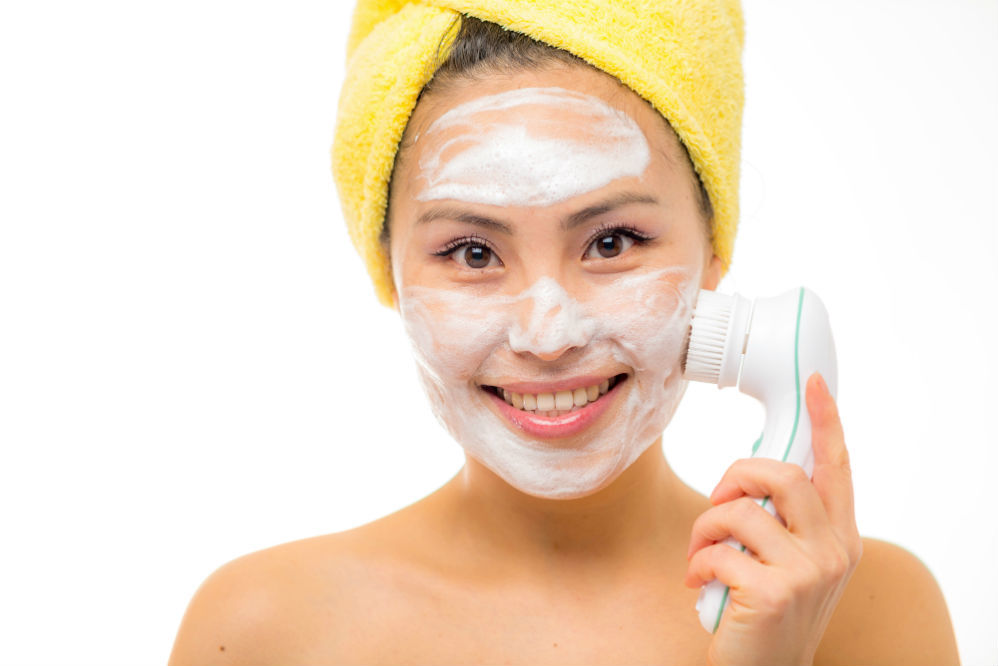How Often Should You Exfoliate Your Face: Simple Guidelines for Healthier Skin
You’ve heard it said countless times before that exfoliating is a must if you want clearer skin, but frankly, even if you have one or two products in your possession, you’re not too sure on the particulars and often wonder just how often should you exfoliate your face or if that exfoliant is really right for you.
If you read that paragraph and identified with it on a visceral level, well then, don’t worry because we don’t blame you! Not only do there seem to be a hundred and one different types of exfoliants out there on the market, but there are also so many contradicting how-tos surrounding the whole process of exfoliating!
There are physical and chemical exfoliants that don’t seem to be doing anything different for you, products that say you can use them daily when there are articles online that say you should be using them sparingly, and even DIYs you aren’t sure really work.
At this point, maybe you aren’t even sure if you should be exfoliating at all! But hey, making sure you remove your makeup and moisturize served you pretty well until this point, right?
If you find yourself asking some, if not all, of these questions, then this article may just be for you! We’ll provide a sweet and short discussion on what exfoliating does for you, how often you should be doing it, what kind of exfoliants there are available and what could be best for you.
So, why should you even bother with this whole exfoliating thing in the first place? That’s exactly why we’re starting with what exfoliating can do for you!
Why Exfoliate?
First of all, you definitely should be exfoliating regularly, and we’re here to tell you why!
Do you know that your body has a natural cell turnover rate of around 30 to 40 days? Your skin’s primary function is to protect your body from external threats like UV radiation and free radicals, and as your skin cells absorb, block, and deal with these threats, they get damaged and have to be replaced. Thus, your body is continuously producing new cells.
As the new cells migrate towards the surface of your skin, the layers of dead cells are sloughed off naturally or through contact with objects or even your hands. This natural skin cell turnover is essential for healthy skin.
Unfortunately, this natural turnover sometimes isn’t enough to get rid of all the dead skin cells piling up on the surface of your skin. This process also naturally slows down as you age, from three weeks when you’re a teenager to around a month or two when you’re an adult, and even slower after you turn 50!
The problem is that if these dead skin cells aren’t removed, then you’re at risk for many things including clogged pores, a dull and uneven complexion, and bacterial infection. These things create the ideal condition for breakouts, too.
The good news though is that you don’t have to rely solely on your body’s natural skin turnover rate to keep your skin healthy–and that’s where exfoliants come in! You can gently remove the upper layers of dead skin cells with chemical or manual exfoliation, and encourage those new cells that your body worked so hard to pump out to the surface.
There. That’s why it’s so important to incorporate an exfoliant into your skincare routine. That said, what exactly should you be using to exfoliate?
What Exfoliants Should You Be Using?
As we mentioned above, there are two basic types of exfoliants: chemical and manual. Meanwhile, there are also some products with a combination of these two.
Manual Exfoliants
Manual exfoliants, also known as mechanical or physical exfoliants, are probably the types of exfoliants you see more often at the drug store. These exfoliants contain gentle abrasive to remove your dead skin cells. They can range from natural ingredients like coffee and walnut shells to man-made ingredients like micro-beads.
Chemical Exfoliants
Chemical exfoliants, on the other hand, use acids or enzymes to eat away at and remove the dead skin cells gently. Common acids used in chemical exfoliants are glycolic, salicylic, and lactic acids. Don’t worry about the thought of these being acids and bad for you as they’re designed only to penetrate the uppermost layers of the surface.
Chemical exfoliants that are designed to penetrate deeper require you to get it done by a professional, but in general, you wouldn’t be able to pick one of those up accidentally on your regular grocery runs anyway. So, no need to worry about it!
Now, there are no hard and fast rules regarding what exfoliant you should be using as every person has different skin types and conditions.
In general, however, all people with different skin types can make use of either chemical or physical exfoliants or a combination of the two. It will definitely just involve some experimentation. For example, if your face is more sensitive or is on the drier side, then you may want to opt for milder exfoliants. People with dry skin tend to respond better to chemical exfoliants as it penetrates well and lacks the physical abrasion from manual exfoliants.
Regular exfoliation will fprovide you with clearer skin and brighter complexion, but how regularly do you have to exfoliate exactly?
How Often Should You Exfoliate Your Face?
Now that we’re all aware that stimulating cell turnover, naturally or through exfoliation, is the key to maintaining a healthy, glowing skin, the next question is, how often you should really be exfoliating?
You may be wondering, if it sounds like it only does good things, then why not do it every day? Well, over-exfoliating your skin, and not just your face, but your body as well may result in increased sensitivity, irritation, and redness.
So, how often should you exfoliate your face? You should always check the instructions on your chosen brand because different products have different formulations. But in general, you can safely use physical exfoliants once every three to four days. With chemical exfoliants, you can typically use it once every week or every two weeks depending on how sensitive your skin is.
Also, don’t forget to wear sunscreen after you use a chemical exfoliant! You should be doing that regularly anyway, but right after using a chemical exfoliant as it’s essential to stay protected from UV rays.
Hopefully, with this simple guide, you find the perfect products for you, as well as that sweet spot of how often to use them so that you and your skin can continue to glow!

